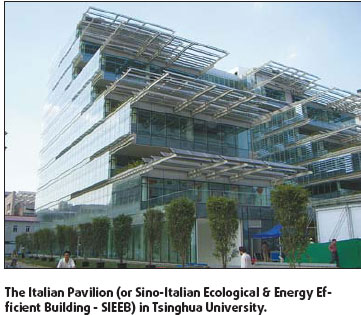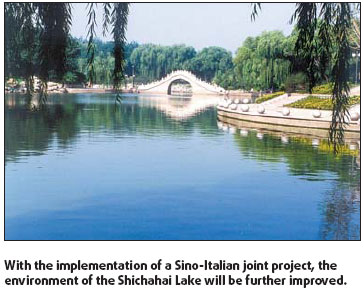| Home / Environment / International Cooperation | Tools: Save | Print | E-mail | Most Read |
| Protecting Urban Environment Together |
| Adjust font size: |
The Italian Ministry for the Environment, Land and Sea started its Environmental Cooperation Program with the Chinese State Environmental Protection Administration (SEPA) in 2000. This program is being implemented in cooperation with a number of Chinese institutions, including the Chinese Academy of Social Sciences (CASS), the Ministry of Science and Technology (MOST), the Ministry of Water Resources, the National Development and Reform Commission (NDRC), the municipal authorities of Beijing, Shanghai, Tianjin, Xi'an and Suzhou, Tsinghua University in Beijing, and Tongji University in Shanghai.
Over 70 projects under the framework of the program have so far been implemented, in areas like environmental monitoring and management, institutional capacity building, natural resources protection and conservation, water sources management, and waste to energy, energy efficiency and renewable energies development, as well as sustainable urban planning, low emission transportation systems and technologies, sustainable agriculture, biodiversity protection and forest management. The projects have been designed and implemented according to the United Nations' conventions and protocols on climate change, ozone layer protection, biodiversity protection, persistent organic pollutants and desertification. The task force is supported by over 60 experts from the Italian Ministry for the Environment, Land and Sea, Chinese ministries and agencies, and Italian and Chinese scientific institutions and universities.
In 2005, the Chinese government identified the program as a model for international cooperation, by awarding the prestigious International Science and Technology Prize to Corrado Clini, director-general of the Italian Ministry for the Environment, Land and Sea. Cooperation projects Since 2003, Italy has been supporting the extraordinary efforts of Beijing in designing and implementing projects aimed at improving the quality of the urban environment. The main projects are: The "Intelligent Transport System"- ITS - for the regulation of urban traffic and reduction of both consumption and emissions. An ITS is currently being implemented in central Beijing to regulate urban traffic, and is designed to reduce fuel consumption and tail gas emissions. The pilot project, which is being developed using Italian expertise and technology, will lead the way to large-scale implementation and use of ITS to regulate traffic in the Beijing urban area and also on access roads to the capital. The "Italian Pavilion" at the Tsinghua University In July 2006, the Italian Pavilion (or Sino-Italian Ecological & Energy Efficient Building - SIEEB) was inaugurated at China's most prestigious university. SIEEB will stand as a benchmark for the use and dissemination of highly energy efficient and environmentally friendly materials and technologies in the Chinese building construction industry. SIEEB has been designed by an Italian architect under the supervision of the Politecnico di Milano (Polytechnic University of Milan) and its construction was managed by Italian engineering firms. The pavilion, entirely built using Italian technology, showcases Italian companies and Italian innovation in the areas of building materials, decentralized energy production and conservation, water conservation and recycling. Solar energy for the Olympic Games This consists of two projects for the use of solar technology for water heating and air-conditioning. The already completed first project, which involved work in the Beijing Organizing Committee for the Games of the XXIX Olympiad (BOCOG) headquarters, is fully operational. The second one involves the buildings in the Olympic Village and is currently under implementation. The rehabilitation of urban parks This project of urban regeneration, which began in 2005, is addressing the problem of water eutrophication and pollution in the Shichahai Lake system in Beijing. The project is divided into two phases: The first comprises a feasibility study, using the support of computer models, and the selection of scenarios and choice of the most efficient solutions for restoring water circulation, together with the calculation of the cost and time required for the completion of the work. The second phase, which is currently being implemented, involves the restoration of fresh water circulation in the lake, and the biological purification of the water. Sandstorm prevention and control in Beijing The prevention of sandstorms is a critical task for the Olympic Games, because the natural phenomena may hamper the holding of outdoor sport events. The project aims to plant trees and grasses in the arid and sandy areas of the Alashan Desert where the sandstorms originate; optimize water resources in the same areas; strengthen the green barriers and the Beijing "green belt"; and use satellite remote sensing for sandstorm monitoring. Low-emission buses In 2004, the first buses equipped with Italian high-efficiency and low-emission natural gas engines were phased into service in Beijing. The design, development and donation of 300 vehicle engines form part of the agreement with the Beijing municipal government to create a "sustainable" transport system in the urban area of the city to be completed in time for the 2008 Olympic Games. Following this, the Beijing Public Transportation Company purchased 1,000 more high-efficiency and low-emission natural gas engines and more than 1,500 EURO 4 diesel engines from the same Italian company. Monitoring air quality in the Beijing Olympic Village and the Olympic venues A laboratory and a monitoring system, designed by Italian experts, are currently being implemented to monitor air quality in sports facilities and in the Olympic village. The "clean air" guarantee is an essential condition for ensuring that the Olympic Games are properly staged, and the Italian project therefore plays a key role in this regard. Sustainable Development and Environmental Management Advanced Training Program for senior civil servants and experts of Chinese private companies This program started in 2003 in cooperation with Venice International University. By the end of 2007, over 2,000 Chinese managers, experts and executives, will attend training classes organized by Venice International University, and go on on-site visits to Italian institutions and enterprises. The program is part of a long-term initiative aimed at facilitating the active and responsible involvement of the Chinese government in global sustainable development and environmental protection. It is one of the most important Italian university cooperation programs ever implemented with China. One of the spin-offs of the program is Tsinghua University's joining of the Venice International University association. (China Daily June 5, 2007) |
| Tools: Save | Print | E-mail | Most Read |
 |
| Related Stories |

